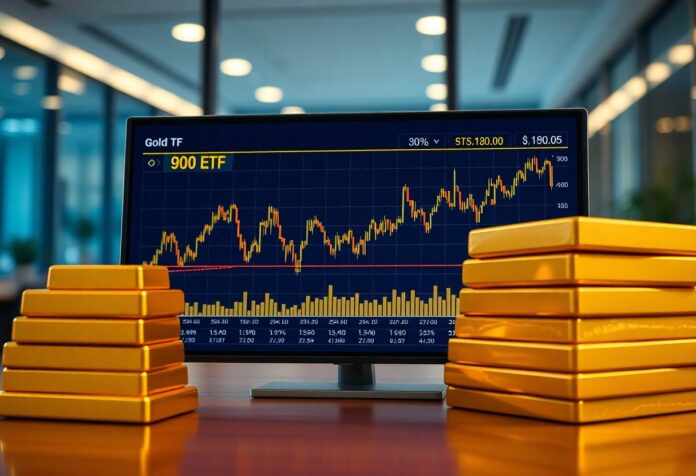It’s time to explore the benefits of Gold ETFs compared to traditional physical gold. As an investor seeking to protect and grow your wealth, understanding the advantages of Gold ETFs can significantly influence your investment strategy. In this post, you will discover eight compelling reasons why Gold ETFs may be the smarter choice for your portfolio, ranging from convenience and cost efficiency to enhanced liquidity and security. Whether you’re a seasoned investor or just starting, this information will help you make informed decisions about your investment in gold.
Key Takeaways:
- Convenience: Gold ETFs allow for easy investment through online platforms, eliminating the need for physical storage or in-person transactions.
- Cost Efficiency: With lower management fees and no additional costs for storage or insurance, Gold ETFs are more budget-friendly than physical gold.
- Liquidity: Gold ETFs can be bought and sold easily on stock exchanges, providing quick access to your funds compared to the challenges of selling physical gold.
- Security: Investing in Gold ETFs means the gold is stored in secure vaults by reputable institutions, reducing the risks associated with physical gold ownership.
- Transparency: Gold ETFs offer real-time pricing and transparency regarding gold reserves, ensuring you can track your investment’s value without hidden dealer premiums.
Convenience of Gold ETFs
For those looking to invest in gold, Gold ETFs provide unmatched convenience compared to physical gold. You can easily purchase shares through an online trading platform with just a few clicks, eliminating the need for in-person transactions or complicated processes often associated with buying physical gold. Unlike physical gold, which requires secure storage and insurance, Gold ETFs simplify your investment by handling the logistics, allowing you to focus on managing your portfolio. This seamless accessibility is particularly beneficial in today’s fast-paced financial environment, enabling you to buy or sell your shares at any time during market hours.
Cost Efficiency of ETFs
To maximize your investment in gold, consider the cost efficiency of Gold ETFs. Unlike physical gold, which often comes with high premiums for jewelry or limited resale value for coins and bars, Gold ETFs typically only charge an annual management fee ranging from 0.25% to 0.40%. This is significantly lower than the ongoing costs associated with storing and insuring physical gold, making ETFs a more budget-friendly option. By choosing ETFs, you can invest in gold without the additional financial burdens, allowing more of your capital to work for you.
Liquidity and Flexibility
Some investors find that liquidity is a significant factor when choosing their investments. With physical gold, selling can be time-consuming and costly, as finding a buyer may not always be easy, and dealers often buy back at lower prices. In contrast, Gold ETFs allow you to buy and sell shares on the stock exchange whenever it suits you during market hours, providing immediate liquidity. You can access your funds typically within a day or two, granting you the flexibility to adjust your investments quickly to meet changing financial needs or market conditions.
Security and Safety of Investments

Assuming you choose to invest in gold, consider the significant advantage of security that Gold ETFs provide. With physical gold, you face the potential risks of theft, loss, or damage, requiring costly and often inconvenient storage solutions. In contrast, when you invest in a Gold ETF, the gold is stored in secure, insured vaults managed by reputable institutions such as HSBC or JP Morgan. This arrangement allows you to focus on your investment, free from the worries of physical asset security.
Purity and Quality Assurance
Clearly, when you invest in gold, purity and quality are imperative factors to consider. With Gold ETFs, you can rest assured that the gold held by the fund typically meets a high purity standard of 99.5% or more, which is regularly audited to verify its quality. This eliminates the worry of purchasing impure or counterfeit gold, often a risk when dealing in physical gold, especially from less reputable sources. By choosing Gold ETFs, you safeguard your investment against these quality concerns, ensuring that your assets are backed by reliable, high-quality gold.
Tax Benefits of Gold ETFs
If you’re considering investing in gold, it’s important to understand the tax advantages that Gold ETFs offer. In many regions, including the U.S., long-term capital gains from Gold ETFs may be taxed at a lower rate compared to physical gold, which often faces higher tax liabilities. Additionally, Gold ETFs may not attract wealth taxes that can apply to your physical gold holdings. These tax efficiencies can significantly enhance your overall returns, especially if you’re a long-term investor seeking to maximize the benefits of your investments.
Diversification and Portfolio Balance
Your investment strategy benefits greatly from diversification, and Gold ETFs can simplify this process. Rather than managing a single, illiquid asset like physical gold, Gold ETFs provide you with shares in a fund representing a mix of gold holdings. This approach not only reduces the risk associated with owning one type of asset but also allows you to easily adjust your portfolio, enhancing its overall balance. Many Gold ETFs further offer exposure to other gold-related assets, such as gold mining stocks, giving you greater potential for returns without overexposure to any single investment.
Transparency and Real-Time Pricing
Once again, Gold ETFs stand out for their transparency and real-time pricing. When investing in physical gold, you may encounter fluctuating premiums and dealer buyback prices, making it hard to gauge your asset’s true value. With Gold ETFs, you can track the price closely aligned with the spot price of gold, providing you with up-to-the-minute information on your investment’s worth. This level of visibility ensures you are always informed, allowing you to make better decisions based on real-time market conditions.
To Wrap Up
Summing up, choosing Gold ETFs over physical gold can significantly enhance your investment experience. By opting for ETFs, you gain access to greater convenience, cost efficiency, liquidity, and security, while minimizing concerns about purity and quality. Additionally, the favorable tax treatment and potential for diversification make ETFs an attractive option for managing your portfolio. With real-time pricing and transparency, you can confidently navigate the gold market and make informed decisions that align with your financial goals.
FAQ
Q: What are Gold ETFs, and how do they work?
A: Gold Exchange-Traded Funds (ETFs) are investment funds that hold physical gold bullion and trade on stock exchanges. When you buy shares of a Gold ETF, you own a portion of the fund, which in turn owns gold held in secure vaults. This allows investors to gain exposure to gold prices without physically owning the metal, making it convenient to buy and sell during market hours.
Q: How do Gold ETFs provide liquidity compared to physical gold?
A: Gold ETFs offer immediate liquidity since they are traded on stock exchanges. Investors can buy or sell shares at market prices during trading hours, allowing for quick access to funds. In contrast, selling physical gold can take time, requires finding a buyer, and may involve price negotiations, resulting in less favorable transaction conditions.
Q: What are the storage requirements for physical gold versus Gold ETFs?
A: Storing physical gold necessitates secure storage options like a safe at home or a safety deposit box at a bank, both of which involve costs and risks. In contrast, Gold ETFs eliminate these concerns since the fund holds the gold in secure, insured vaults managed by trusted institutions, letting investors focus on their investment rather than storage logistics.
Q: Are there any tax advantages to investing in Gold ETFs over physical gold?
A: Yes, Gold ETFs can offer favorable tax treatment in certain jurisdictions. For example, in the U.S., long-term capital gains from Gold ETFs may be taxed at lower rates compared to physical gold. Additionally, Gold ETFs may not attract wealth taxes that physical gold does in some regions, enhancing overall returns for long-term investors.
Q: How do Gold ETFs ensure the quality and purity of the gold they hold?
A: Gold ETFs maintain high standards for the gold they hold, typically ensuring a purity of 99.5% or greater. The gold holdings are regularly audited to confirm their quality and authenticity. This provides peace of mind for investors, eliminating concerns about potential counterfeit or subpar gold that can arise with physical purchases.
Q: Can Gold ETFs contribute to portfolio diversification?
A: Absolutely. Gold ETFs allow investors to diversify their portfolios easily, as they represent shares in a fund that includes a portion of a diversified gold reserve. This offers more flexibility than owning large amounts of physical gold and may also provide exposure to additional gold-related assets, such as mining stocks, enhancing overall diversification.
Q: How do Gold ETFs provide transparency in pricing compared to physical gold?
A: Gold ETFs are priced according to the spot price of gold, and their values can be monitored in real-time on stock exchanges. This contrasts with physical gold, where prices can fluctuate due to dealer markups or buyback prices. Investors in Gold ETFs can confidently assess the value of their investments without worrying about hidden premiums or discounts.
Disclaimer
The content provided in this article is for informational purposes only and should not be considered as financial or investment advice. While we strive to provide accurate and up-to-date information, we make no guarantees about the completeness, accuracy, or reliability of the content. Any action you take based on the information presented in this article is strictly at your own risk. We recommend consulting with a qualified financial advisor before making any investment decisions. Dawkco News and Sanjay Gupta will not be held responsible for any losses or damages incurred from the use of this information.


